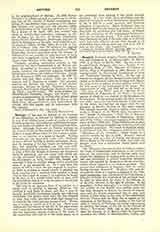

Betting.—A bet may be defined as the backing of an affirmation or forecast by offering to forfeit, in case of an adverse issue, a sum of money or article of value to one who, by accepting, maintains the opposite and backs his opinion by a corresponding stipulation. Although there are no Federal statutes in the United States on this matter, many of the States make it a penal offense when the bet is upon a horse-race, or an election, or a game of hazard. Betting contracts are also frequently made void. Similarly in Great Britain betting in streets and public places, and the keeping of betting houses are forbidden by law, and wagering contracts are null and void. Such laws are just and useful, inasmuch as they serve to keep within the bounds of decency the dangerous habit of gambling, and the many evils which are usually associated with it. Although betting is to be discouraged as being fraught with danger, and although it may be morally wrong, still in particular cases it is not necessarily so. As I may give the money of which I have the free disposal to another, so there is nothing in sound morals to prevent me from entering into a contract with another to hand over to him a sum of money if an assertion be found to be true, or if a certain event come to pass, with the stipulation that he is to do the same in my favor if the event be otherwise.
This may be an innocent form of recreation, or a ready way of settling a dispute. However, the practice is very liable to abuse, and that it may be morally justifiable theologians require the following conditions: The parties must have the free disposal of what they stake, and both must bind themselves to stand by the event and pay in case of loss. Welshing is wrong in morals as it is in law. Both must understand the matter of the bet in the same sense, and it must be uncertain for them both. If, however, one has absolutely certain evidence of the truth of his contention, and says so to the other party, he is not precluded from betting if the latter remains obstinate. If a bet fulfils these conditions and the object of it is honest, so that the bet is not an incentive to sin, it will be a valid contract, and therefore obligatory in conscience. Debts of honor then are also debts that we are bound in conscience to pay if they fulfil the conditions just laid down. It follows that the avocation of the professional bookmaker need not be morally wrong. It is quite possible to keep the moral law and at the same time so to arrange one’s bets with different people that, though in all probability there will be some loss, still there will be gain on the whole. (See Gambling.)
T. SLATER

